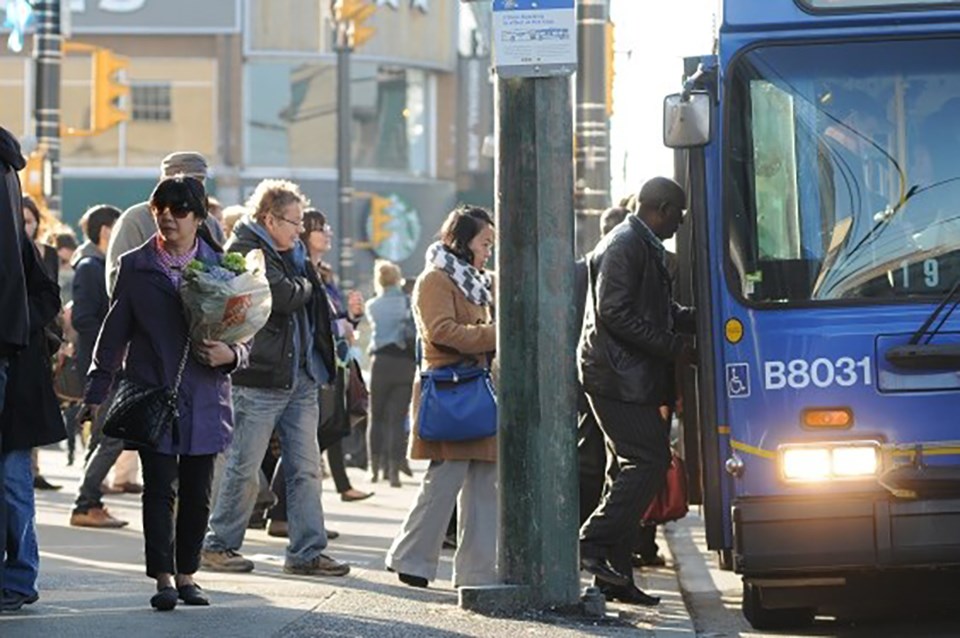Transit fares in the Lower Mainland will rise between five and 15 cents per ride on Canada Day, after TransLink’s board of directors approved a 2.3 per cent fare hike Wednesday at its first quarterly meeting in 2024.
A one-zone adult pass will rise from $3.15 to $3.20 whereas a three-zone adult pass will jump from $6.20 to $6.35. One- and three-zone monthly adult passes will rise $2.40 and $4.35, respectively, to $107.30 and $193.80.
This year’s fare hike is the fifth year TransLink will have frozen fares or kept hikes below the rate of inflation.
But, in 2025, the government-sanctioned agency is expected to raise fares by four per cent across the system.
The fare hikes come as TransLink continues to plead with the federal government for additional funding to buy more buses and build more infrastructure to match accelerating population growth — all while trying to keep costs affordable for transit users.
Olga Kuzentsova, TransLink’s vice-president of financial services, told the board the agency faces a “structural deficit” starting in 2026 when a $479-million provincial government operating subsidy runs dry. That subsidy was in addition to $661 million provided by provincial and federal governments during the pandemic to maintain service levels despite a significant drop in riders.
Overall, in 2023, ridership reached just 85.6 per cent of pre-COVID levels in 2023, on average, according to an annual report presented to the board. Another report indicates ridership peaked at one point in 2023 to 90 per cent compared to pre-pandemic levels.
Thanks to the boost, TransLink took in $493 million from fares, in 2023, an increase of $97.6 million from 2022, or 24.7 per cent jump — and also a $31.5 million, or 6.8 per cent jump, from what was initially expected.
Between 2026 and 2033, TransLink asserts lower ridership and fare revenue will account for a $1.9-billion hole in the budget, in total.
Additionally, $958 million is estimated to be lost via declining fuel taxes, with the advent of ubiquitous electric vehicles.
Fuel tax revenues declined $34 million to $390 million in 2023, or 8.0 per cent.
And as less money is expected to come in, more money exits the agency by way of inflationary pressures: operating costs per kilometre have increased, on average, 4.3 per cent annually since 2018 and costs increased 6.5 per cent last year as a result of higher labour and maintenance costs driven by inflation, the report stated.
However, making up some of these deficits is a rise in property taxes and parking sales tax.
TransLink’s 2024 investment plan, which is now open to , includes a one-time property tax increase proposal for 2025, amounting to a roughly one per cent increase, or $37 for a house valued at $1.2 million. This $80-million total is in addition to the 4.15 per cent annual increase the Mayors’ Council approved as part of the 2022 investment plan.
In 2023, TransLink collected $463 million in property taxes as compared to $437 million in 2022, for a 5.8 per cent increase.
TransLink wants to increase service on 60 routes to address overcrowding, which is particularly pronounced in the south and eastern portions of the region, namely Surrey and Langley.
TransLink CEO Kevin Quinn told the board another unknown factor for ridership projections is a provincial government plan to build more housing units along transit corridors.
Quinn’s report shows on-time performance declining since the pandemic, to 79.7 per cent, below the 80.5 per cent rate in 2019.
While TransLink’s annual report showed salaries, wages and benefits accounting for $882 million of the $2.13 billion in operating expenses, the agency has not yet issued its statement of financial information for 2023.
In 2022, the statement showed Quinn’s total remuneration was $507,495, which has largely flatlined since 2019, when the position saw a $52,000 increase in pay.
The next highest paid individual at TransLink is president and general manager of Coast Mountain Bus Corp. Michael McDaniel, who earned $405,002, up from $314,338 in 2019.
Coast Mountain recently resolved a labour dispute that saw transit supervisors strike due to insufficient pay raises, thus shutting down bus service for two days in January. A mediated settlement was reached Feb. 1.
In 2022, the 10-member board was compensated $677,349 total.


